Overview
Commercial investment property loans represent specialized financing options tailored for the acquisition or refinancing of business-related assets. These loans typically necessitate a substantial down payment and customized terms that align with the unique needs of businesses. Understanding eligibility criteria, market trends, and strategic financing approaches is crucial for successfully navigating the complexities of securing these loans.
Furthermore, robust financial documentation and a well-defined business plan significantly enhance the chances of approval. Are you prepared to take the next step in securing the financing your business requires?
Introduction
In the realm of commercial property investment, grasping the intricacies of financing options is essential for achieving success. Commercial investment property loans present specialized solutions for acquiring or refinancing properties utilized for business purposes, ranging from warehouses to retail spaces. Unlike traditional residential loans, these financing options come with distinct requirements and features, such as higher deposit amounts and varying terms. As the commercial property market continues to evolve, characterized by significant loan commitments and a stabilizing landscape, investors are increasingly recognizing the potential of these financial products. By effectively navigating the complexities of commercial loans, small business owners can unlock substantial opportunities for growth and profitability in their investment ventures.
Understanding Commercial Investment Property Loans
Commercial investment property loans represent customized financing solutions specifically designed for the acquisition or refinancing of assets used for business purposes, including warehouses, retail spaces, factories, and hospitality enterprises. Unlike conventional residential financing, these loans typically necessitate a larger down payment—often around 30% of the asset's worth—reflecting the heightened risk associated with such investments. The framework of these financial agreements can vary, offering both fixed and variable interest rates, along with options for principal and interest or interest-only payments.
Understanding the intricacies of commercial investment property loans is essential for investors aiming to leverage these assets for income generation or business growth. Key features of these financial products include terms that generally range from 5 to 30 years, depending on the lender and the specific option chosen. Recent trends indicate a robust market for commercial investment property loans, with new loan commitments for acquisitions reaching $16.23 billion in the December quarter of 2023.
This significant statistic underscores the strong demand for commercial investment property loans, particularly among small business owners eager to invest in real estate.
Investors should also remain cognizant of the current landscape regarding commercial investment property loans, where the share of total real estate exposures that are non-performing has decreased from 0.78% to 0.73% as of June 2024. This decline suggests a stabilizing market, potentially encouraging more investors to view commercial investment property loans as viable investment opportunities.
Concerning average deposit requirements, while 30% is standard, some lenders may offer flexibility based on the borrower's financial profile and the specific type of asset. Successful case studies demonstrate how innovative lending processes, such as those utilized by Finance Story, can provide tailored options for commercial investment property loans that cater to the unique circumstances of each investor. By developing refined and tailored business cases for banks, Finance Story enhances its service offerings, ensuring clients can navigate the complexities of obtaining commercial investment property loans effectively.
Moreover, refinancing options are available to address the evolving needs of businesses, further reinforcing Finance Story's commitment to flexibility and specialized expertise in the real estate sector.
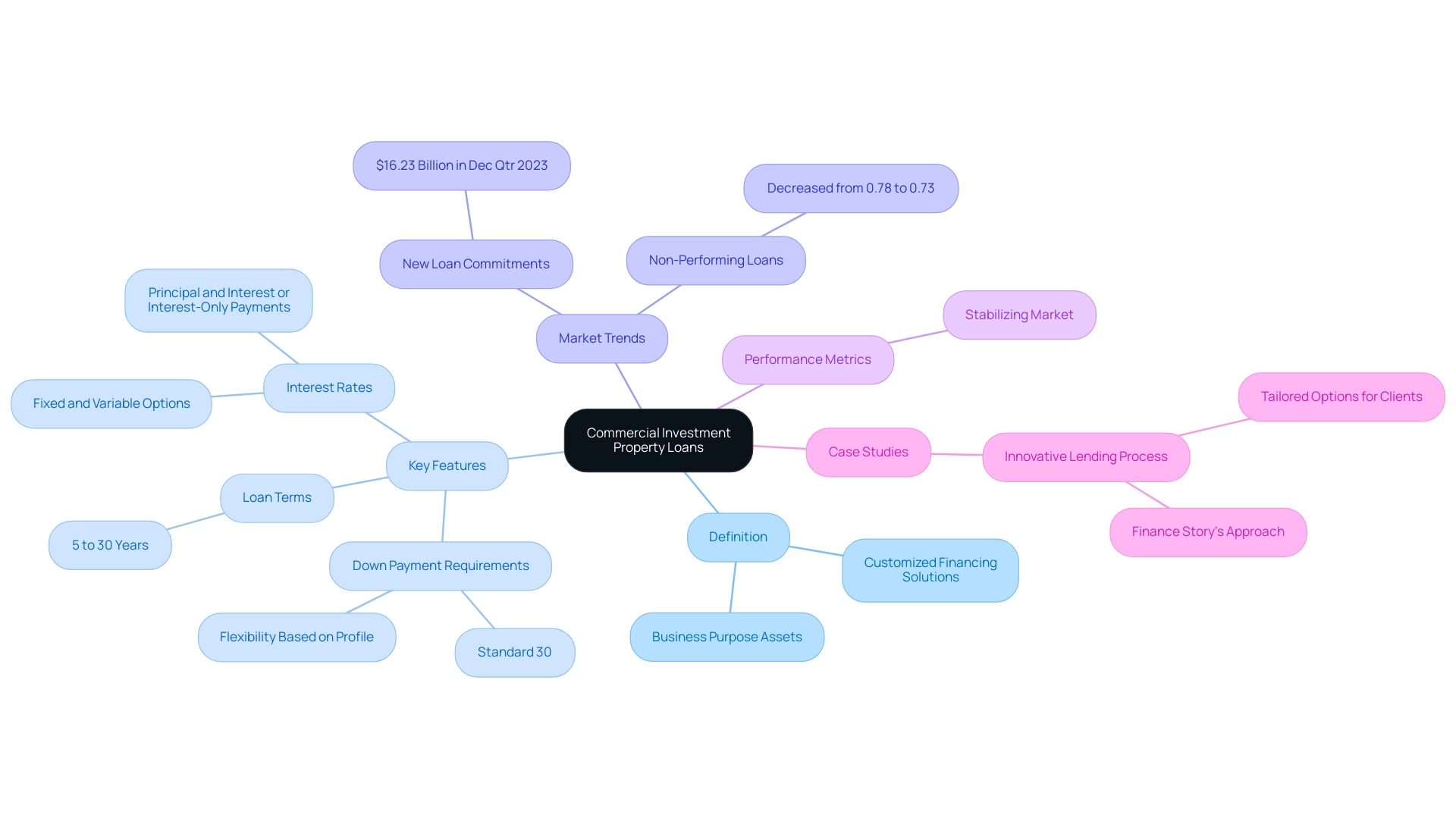
Eligibility Criteria for Commercial Property Loans
Qualifying for commercial investment property loans requires meeting several key criteria prioritized by lenders. A strong credit score is essential, with the average required score for 2025 hovering around 680. This benchmark reflects lenders' increasing emphasis on creditworthiness in a competitive market.
Additionally, a well-structured business plan is crucial, as it demonstrates the borrower's strategy for generating income from the asset. At Finance Story, we specialize in creating polished and highly individualized business cases to present to banks, enhancing your chances of securing the right financing.
Lenders will conduct a thorough assessment of the borrower's financial history, which includes reviewing tax returns, bank statements, and other relevant documentation to gauge their repayment capacity. The asset itself must also meet specific standards; it should be commercially zoned and have the potential to generate income.
In numerous instances, lenders may demand a minimum deposit of 30% of the asset's value, emphasizing the necessity of having ample capital upfront.
Expert guidance indicates that borrowers should prepare a thorough financial overview, including detailed cash flow forecasts and a clear outline of how the asset will be utilized. This preparation can significantly enhance the likelihood of approval. Statistics indicate that successful borrowers often have a mix of personal and business assets, showcasing their financial stability and commitment to the investment.
Recent statistics reveal that dwelling approvals have grown in New South Wales (25.2%), Victoria (20.1%), South Australia (9.9%), Tasmania (8.0%), and Western Australia (1.9%), indicating a positive trend in the real estate market that could influence lending decisions. Dr. Chatterjee noted, 'So going forward by early 2025, we do see the economy picking up, assuming that there are no other further disturbances or nothing major going on with the economy.' This insight highlights the potential for enhanced lending conditions as the economy stabilizes.
Case studies demonstrate that businesses with a strong history of profitability and a clear growth strategy are more likely to obtain favorable credit terms. For example, a small enterprise that showed steady income growth and had a clear strategy for using the real estate was able to obtain funding despite initial worries regarding market conditions. Furthermore, the profitability of various industries can significantly impact eligibility for financing; sectors like mining have demonstrated strong earnings, while others have encountered challenges, emphasizing the significance of industry-specific strategies for sustaining profitability.
In summary, understanding the eligibility criteria and requirements for commercial investment property loans in 2025 is crucial for potential borrowers. By focusing on creditworthiness, financial documentation, and a robust business plan, small business owners can position themselves favorably in the eyes of lenders. With the expertise of Finance Story, they can navigate the complexities of securing tailored financing solutions.
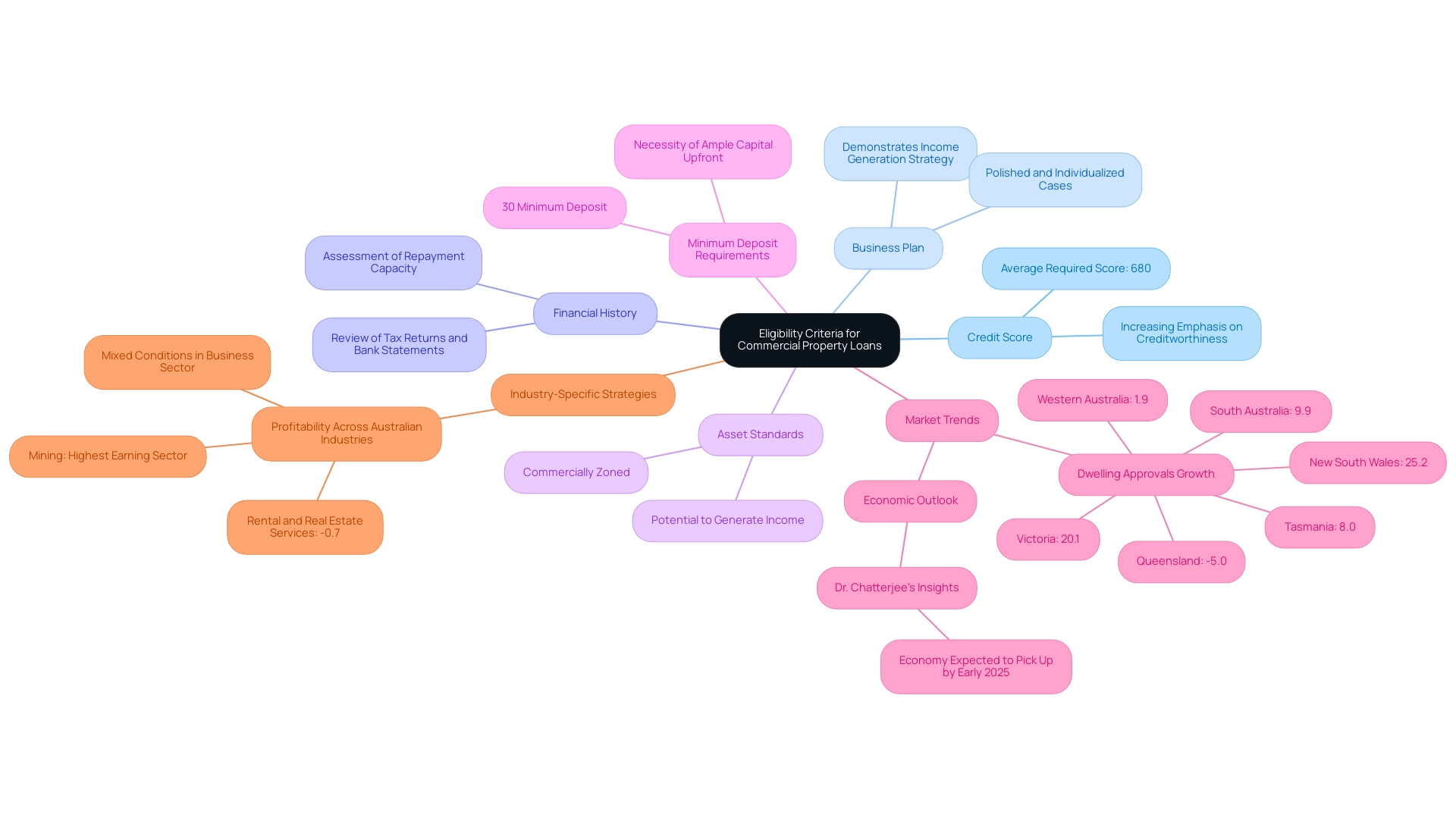
Commercial vs. Residential Property Loans: Key Differences
Prospective borrowers must understand the crucial differences between commercial investment property loans and residential financing. One of the most significant distinctions lies in the deposit requirements; business financing typically demands a larger deposit, often around 30%, while residential financing can be secured with deposits as low as 5%. This disparity reflects the heightened risk associated with business assets, which is also evident in the interest rates.
Interest rates for business financing are generally elevated due to this increased risk profile.
When it comes to the duration of financing, business real estate loans usually have shorter terms, ranging from 5 to 15 years, in contrast to residential financing that can extend up to 30 years. This shorter timeframe can significantly impact cash flow and repayment strategies for investors. Furthermore, the assessment process for business loans varies considerably; lenders often evaluate the income-generating capacity of the asset rather than relying solely on the borrower's creditworthiness.
This shift in focus can lead to different funding outcomes depending on the asset's performance.
At Finance Story, we specialize in crafting refined and highly personalized business cases to present to banks, ensuring that small business owners can secure the right financing for their investments. We provide a comprehensive range of lenders, including high street banks and innovative private lending panels, tailored to meet diverse circumstances. Our expertise in customized financing proposals and refinancing solutions empowers us to navigate the complexities of commercial property financing effectively.
Recent trends indicate an increasing awareness among borrowers regarding the financial strategies associated with these credits. For example, the popularity of offset accounts among Australian mortgage holders has surged, reflecting a shift in how individuals manage their home financing repayments. This trend underscores the importance of understanding the financial instruments available to enhance management.
The record high balances in offset accounts suggest a growing recognition of their benefits in managing home repayments, indicating a transformation in financial strategies among borrowers.
As we approach 2025, the landscape for business and residential loans continues to evolve. The portion of non-performing real estate exposures has slightly decreased, from 0.78% to 0.73%, signaling a stabilizing market. However, the flow of new listings has slowed, with 26,423 new homes listed nationally over the 28 days leading to December 22nd, down 0.8% from the same period in 2023, suggesting a cautious approach among buyers.
As Ms. Ezzy noted, "Given current conditions are skewing in favor of buyers, it's unsurprising to see it take a little longer to secure a sale as buyers take their time assessing their options."
In summary, understanding the distinctions between business and residential financing is essential for making informed financial decisions. By considering factors such as deposit requirements, interest rates, loan terms, and evaluation criteria, borrowers can better navigate the complexities of securing funds for their commercial investment property loans. With Finance Story's expertise and a wide selection of lenders, small business owners can confidently address their funding needs, utilizing customized solutions to achieve their investment objectives.
We encourage you to contact Finance Story for assistance in obtaining the appropriate funding for your investment ventures.
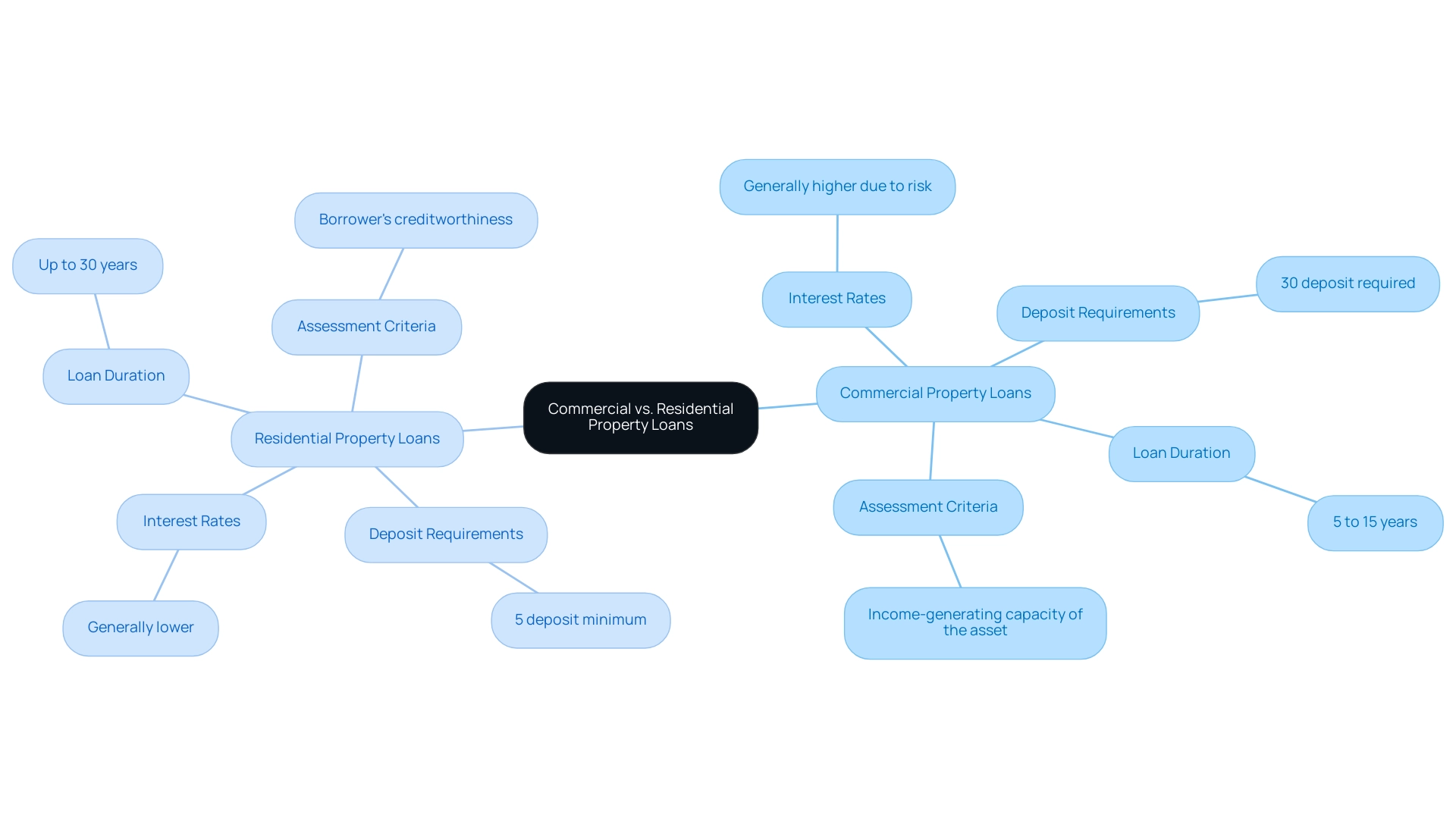
Navigating the Application Process for Commercial Loans
Obtaining commercial investment property loans requires a methodical strategy that can significantly impact the outcome of your application. Here are the essential steps to follow:
-
Assess Your Needs: Clearly define the purpose of the financial assistance and determine the amount required. This foundational step ensures that you approach lenders with a focused plan.
-
Gather Documentation: Compile all necessary documents, which typically include financial statements, tax returns, and detailed information about the asset in question. Proper documentation is critical, as it provides lenders with a comprehensive view of your financial health and the viability of commercial investment property loans.
-
Choose a Lender: Conduct thorough research to identify lenders who specialize in commercial investment property loans. Look for institutions with a strong track record in funding similar properties or businesses, as their expertise can be invaluable. At Finance Story, we specialize in creating polished and highly individualized business cases to present to banks, ensuring you have the best chance of securing the right financing. We also offer access to a full range of lenders to suit your circumstances for securing commercial investment property loans, whether you are buying a warehouse, retail premise, factory, or hospitality venture.
-
Submit Application: Complete the lender's application form meticulously and submit it alongside your gathered documentation. Ensure that all information is accurate and up-to-date to avoid delays.
-
Await Approval: After submission, the lender will review your application. This process can take several weeks, during which you may be asked to provide additional information or clarification. Being responsive and prepared for follow-up questions can expedite this phase.
-
Finalize the Financing: Upon approval, carefully review the terms of the agreement. Once satisfied, sign the agreement to finalize the loan and receive your funds.
Grasping these steps is essential, as it not only simplifies the application procedure for commercial investment property loans but also enhances your chances of obtaining the required funding. As Tim Coy, Senior Research Leader at Deloitte, mentions, "Navigating the complexities of real estate funding requires a clear understanding of the market and the specific needs of your investment." Additionally, the growing importance of sustainability in commercial property investments is highlighted by a recent case study on deep energy retrofits, which shows that 76% of global survey respondents plan to undertake such projects in the next 12 to 18 months.
This trend underscores the necessity for investors to consider environmental factors in their funding choices. Furthermore, it is important to be aware of recent corrections in published data regarding external and internal refinancing, as this knowledge can influence your understanding of the current funding landscape. By adhering to these guidelines, you can navigate the intricacies of business loans with increased confidence and effectiveness.
To further enhance your funding strategy, consider booking a free personalized consultation with Finance Story's Head of Funding Solutions, Shane Duffy. Discuss your needs and objectives, and allow us to assist you in creating your next chapter in property investment.
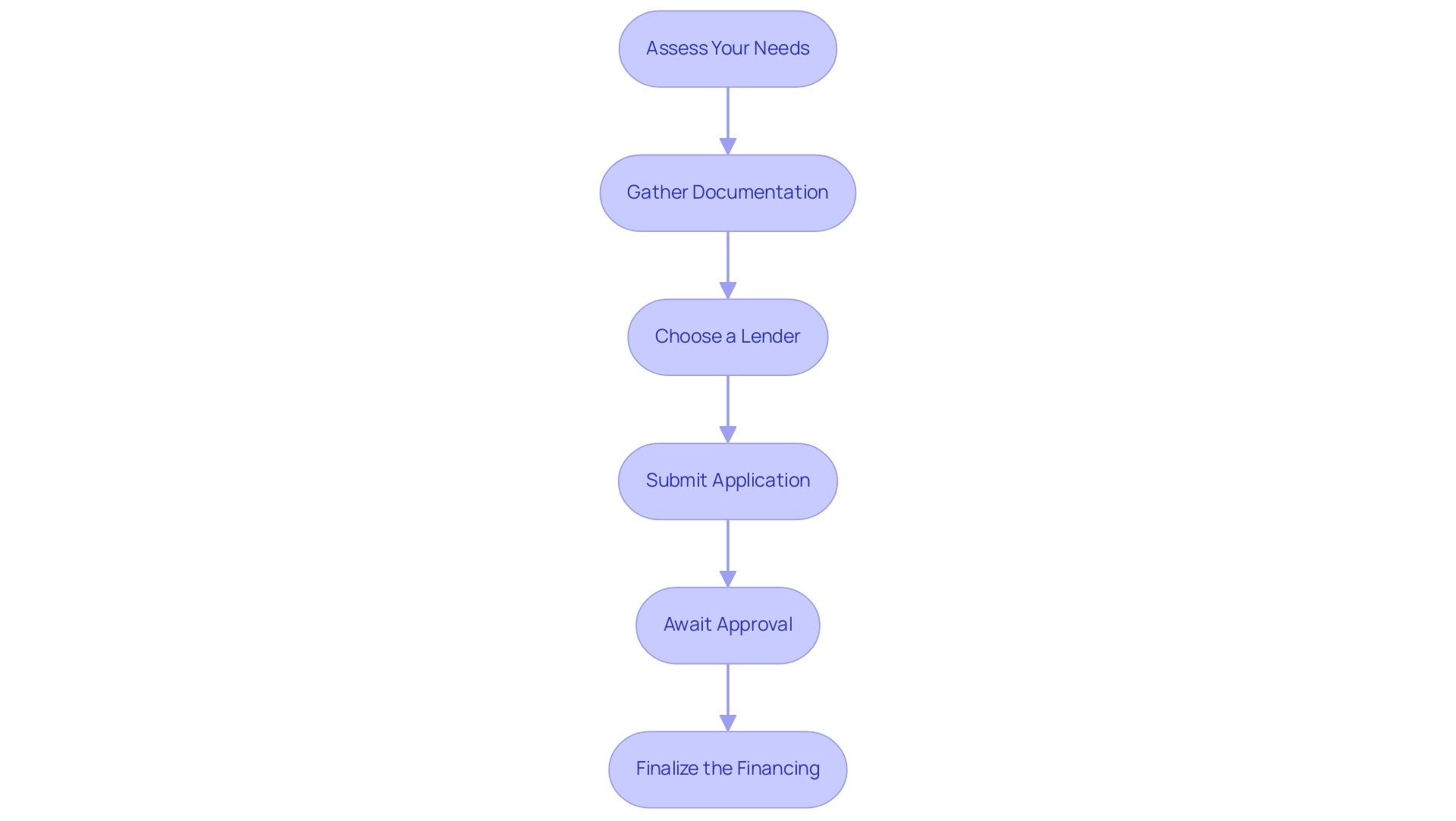
Selecting the Right Lender for Your Commercial Loan
Choosing the right lender for your business financing is essential for securing favorable terms and ensuring a smooth funding process. Consider these key factors:
- Lender Specialization: Select lenders that focus on commercial loans. Their expertise in the market enables them to comprehend your unique needs and provide tailored solutions. As we approach 2025, the lending landscape is evolving, with lenders broadening their offerings to meet market demands. For example, some lenders are now offering solutions up to $6 million, which can be particularly beneficial for larger investments.
- Loan Products Offered: Evaluate the variety of loan products available, including both fixed and variable rates. A diverse selection empowers you to choose terms that align with your investment strategy, whether you require short-term funding or long-term stability.
- Interest Rates and Fees: It is vital to compare interest rates and associated fees across different lenders. This comparison can unveil competitive deals that significantly influence your overall financing costs. As of 2025, average interest rates vary by lender type, making thorough research indispensable.
- Customer Service: Assess the lender's reputation for customer service. A supportive lender can streamline the process, facilitating navigation through any challenges that arise during the financing application and approval stages.
- Flexibility: Seek lenders that offer flexible terms and conditions. This flexibility can be advantageous if your financial situation changes, enabling you to adjust your commercial investment property loans agreement without incurring substantial penalties.
Investing time in researching and comparing lenders can lead to more favorable financing outcomes. For instance, Finance Story has distinguished itself through its innovative lending solutions, granting clients access to a diverse portfolio of private lenders and mainstream financial institutions. This adaptability not only enhances service offerings but also positions Finance Story as a leader in the finance industry, particularly for clients facing challenging financial situations.
Belinda Wright, head of partnerships and distribution at a non-bank lender, emphasizes that the market is poised for growth, stating, "Thinktank is poised to help brokers and customers capitalize on market opportunities with expanded offerings for purchases, refinancing, and equity release." This insight reflects current trends in business lending, which can be advantageous for small business owners.
Moreover, testimonials from satisfied clients underscore Finance Story's effectiveness. As Natasha B. from VIC states, "I will definitely be recommending your business to anyone. We are finished with the constant worry. Once again, thank you so much for being a part of our journey." By considering these factors and leveraging expert insights, you can make informed decisions that align with your investment goals.
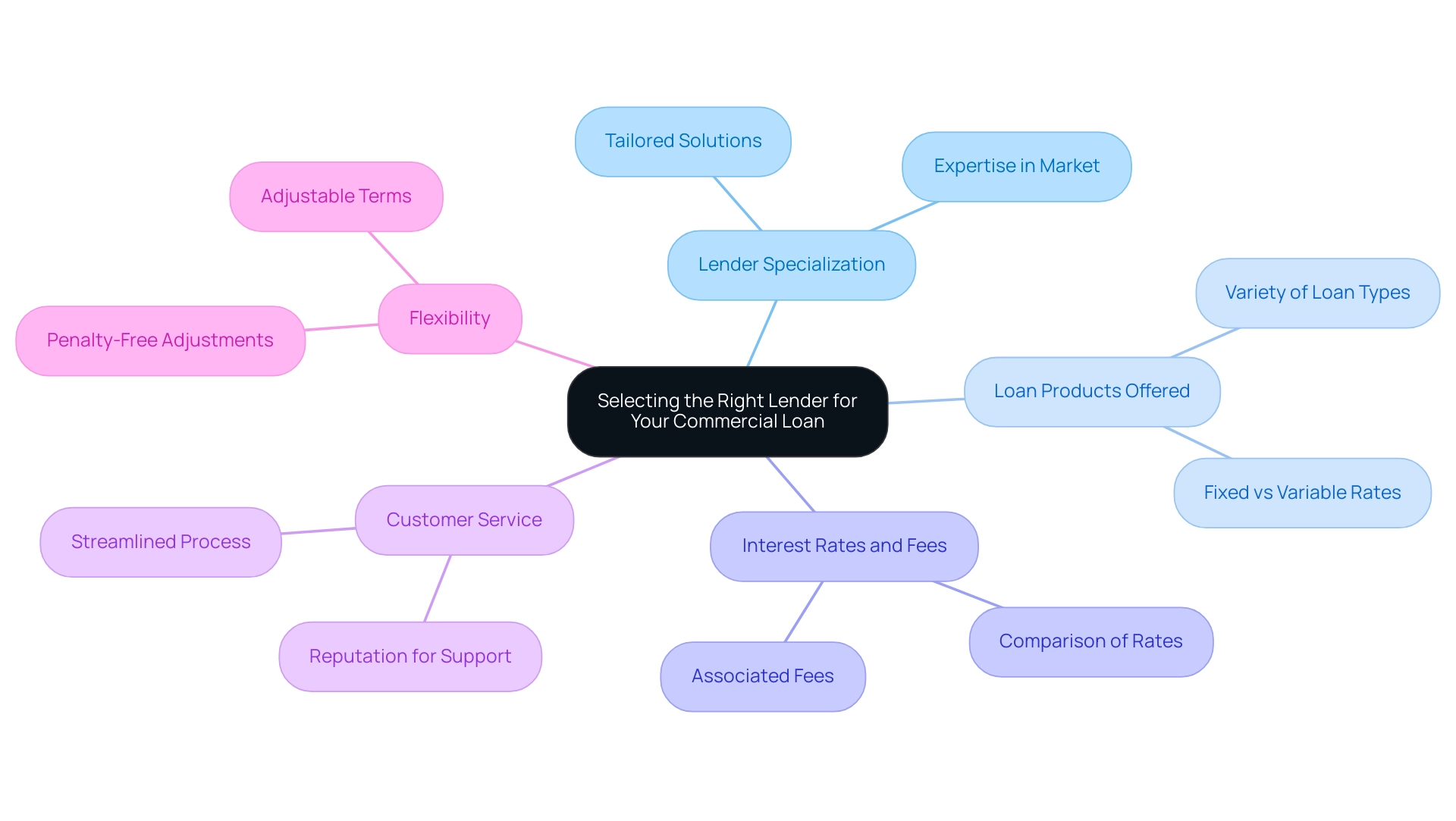
Avoiding Common Pitfalls in Commercial Property Financing
Navigating the financing landscape for commercial property can be fraught with challenges. Investors must be aware of several common pitfalls to enhance their chances of success:
- Inadequate Research: Insufficient research into the property and its market can lead to misguided investment decisions. In 2025, the Counselors of Real Estate predict that declining multifamily construction, coupled with rising demand from younger renters, will exacerbate affordability challenges. This underscores the need for thorough market analysis.
- Neglecting Financial Documentation: Incomplete or inaccurate financial documentation can significantly delay the application process or even result in rejection. Ensuring that all financial records are accurate and comprehensive is crucial for a smooth funding experience. At Finance Story, we specialize in creating polished and highly individualized business cases to present to banks, ensuring your financial documentation meets the necessary standards.
- Ignoring Loan Terms: A lack of understanding regarding loan terms—including interest rates and repayment schedules—can lead to unexpected costs. Investors should take the time to fully comprehend these terms to avoid financial strain down the line. Our expertise at Finance Story can help clarify these terms, ensuring you understand the implications of your financing decisions.
- Overestimating Income Potential: Many investors fall into the trap of overestimating a property's income potential, which can lead to cash flow issues. Realistic projections based on market conditions are essential for sustainable investment. We advise our clients to conduct thorough market analyses to avoid this pitfall.
- Choosing the Wrong Lender: Selecting a lender without considering their specialization and reputation can result in unfavorable loan conditions. It is essential to collaborate with a lender who comprehends the subtleties of commercial investment property loans for business funding. At Finance Story, we provide access to a full suite of lenders, including high street banks and innovative private lending panels, tailored to your specific circumstances.
By being vigilant about these pitfalls, investors can navigate the funding process for commercial investment property loans more effectively, positioning themselves for success in the competitive landscape of commercial property investment. Additionally, case studies reveal that innovative funding solutions and public-private partnerships are increasingly essential for overcoming barriers in the market, particularly in the context of affordable housing challenges. As emphasized in the case study named 'Opportunities for Affordable Housing,' tackling high construction expenses and interest rates through distinctive funding solutions is essential.
Furthermore, Van W. Martin, President and CEO of Martin Commercial Properties, emphasizes that "the CRE’s Top Ten Issues report is a powerful tool for understanding the forces shaping real estate today," reinforcing the importance of being informed. Understanding these dynamics, along with the increasing insurance premiums driven by inflation and natural disasters, can further empower investors to make informed decisions.
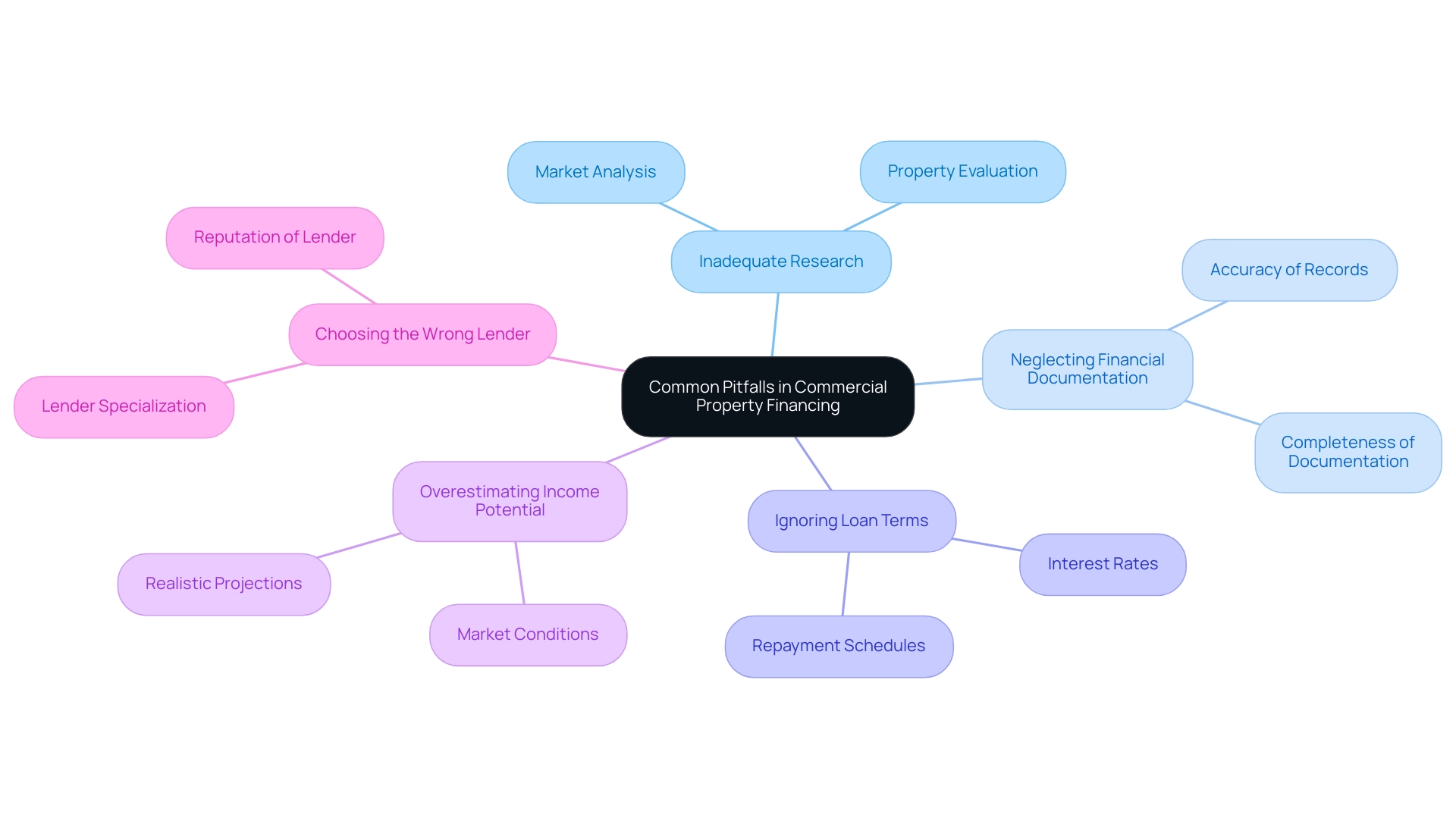
Strategic Financing: Maximizing Your Commercial Property Investment
To optimize your real estate investment, consider implementing the following strategies:
- Utilize Funding: Leverage funding options such as long-term mortgages and credit lines to acquire assets that generate positive cash flow. Finance Story offers tailored solutions, including commercial investment property loans with terms ranging from 15 to 30 years, enhancing your overall return on investment. In 2025, the average cash flow from business assets in Australia is projected to remain robust, underscoring the necessity of strategic funding. Furthermore, the Federal Reserve's interest rate reductions in 2024 may influence funding conditions, making it crucial to stay informed about these developments.
- Diversify Investments: Expand your portfolio by investing in a variety of commercial properties, including retail, office, and industrial spaces. This diversification mitigates risks associated with market fluctuations and can lead to more stable income streams. Recent surveys indicate that 30% of new units could be designated for renters earning less than 80% of the area median income, emphasizing the importance of understanding demographic shifts in your investment strategy.
- Negotiate Terms: Actively negotiate with lenders to secure favorable loan terms. By advocating for improved rates and conditions, you can significantly reduce your expenses, thereby enhancing your profitability. Finance Story specializes in developing refined and uniquely tailored business cases for banks, ensuring you receive the most advantageous terms for your commercial investment property loans.
- Monitor Market Trends: Keep abreast of market trends and economic indicators that impact real estate values and rental income. For instance, the demand for affordable housing continues to outpace supply, prompting the exploration of innovative financing solutions to increase availability. Understanding these trends can empower you to make informed investment decisions.
- Utilize Professional Advice: Collaborate with financial advisors or mortgage brokers who specialize in business real estate investment. Finance Story's expertise in curating expert funding solutions guarantees that your investment decisions align with your financial objectives. As leaders in real estate organizations emphasize the importance of 'accelerated upskilling and reskilling initiatives,' investing in professional development can also enhance your strategic approach to real estate assets.
- Consider SMSF Investments: Investigate the potential of leveraging Self-Managed Super Funds (SMSF) for your real estate investments. Finance Story can guide you through the process of utilizing SMSF to acquire commercial properties, providing tailored solutions that align with your retirement goals, particularly through commercial investment property loans. Implementing these strategies can significantly improve the performance and profitability of your commercial property investments, positioning you for success in the competitive real estate market of 2025. As one satisfied client, Natasha B. from VIC, expressed, 'I will definitely be recommending your business to anyone. We are finished with the constant worry. Once again, thank you so much for being a part of our journey.
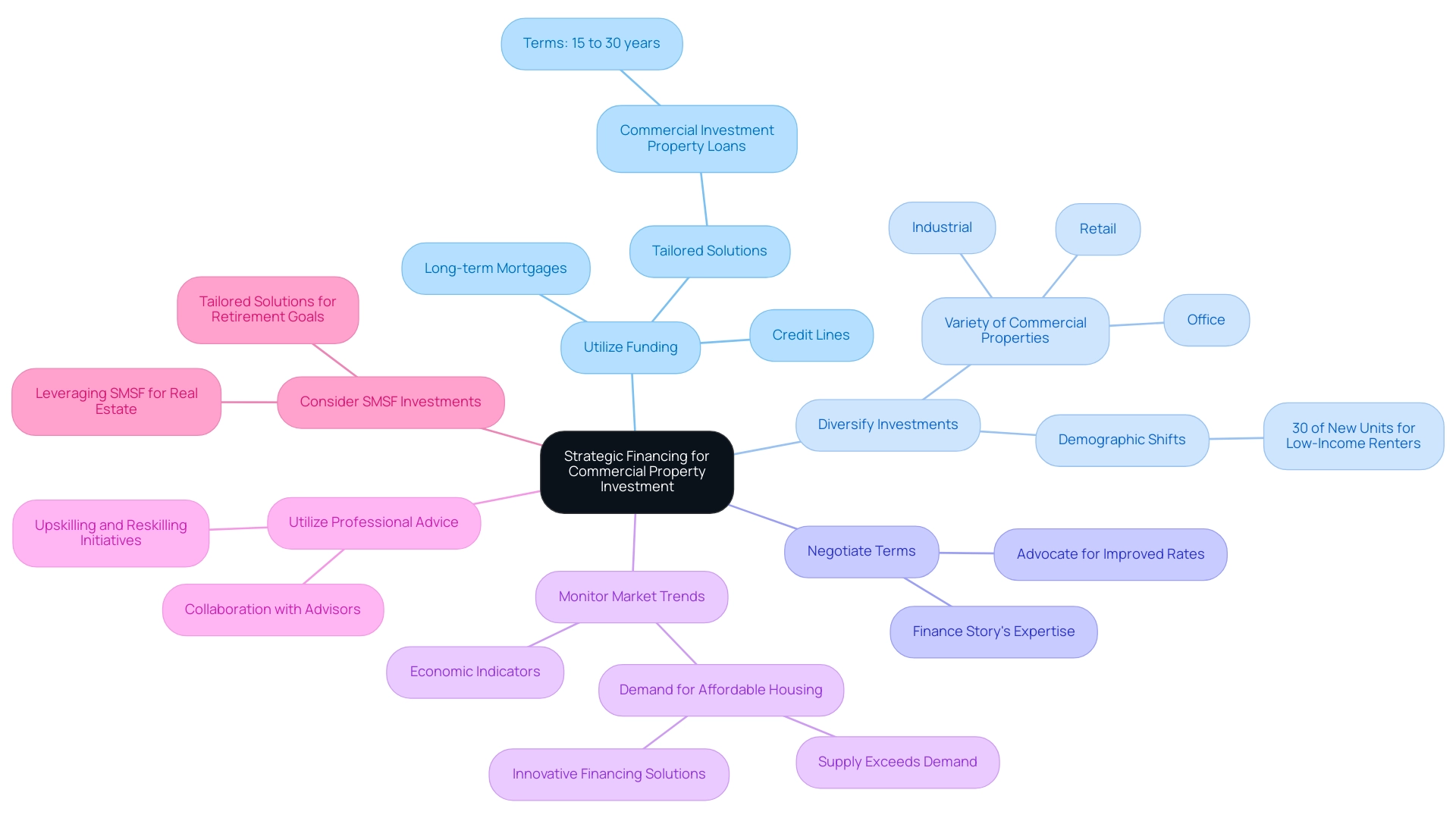
Conclusion
Understanding the nuances of commercial investment property loans is essential for small business owners eager to seize opportunities in the commercial property market. These loans provide specialized financing options that significantly differ from traditional residential loans, featuring higher deposit requirements, varied terms, and distinct eligibility criteria. As the market stabilizes, trends reveal a robust demand for these financial products, with substantial loan commitments underscoring their potential for income generation and business growth.
Navigating the application process effectively is crucial for securing favorable financing. By conducting thorough research, gathering comprehensive documentation, and selecting the right lender, investors can enhance their chances of approval. Furthermore, avoiding common pitfalls—such as inadequate research and neglecting financial documentation—can lead to a smoother financing experience. Understanding the specific differences between commercial and residential loans further empowers investors to make informed decisions tailored to their unique circumstances.
Ultimately, a strategic approach to financing and investment in commercial properties can yield significant returns. By leveraging financing options, diversifying investments, and staying informed about market trends, small business owners can maximize their commercial property investments. With the support of specialized services like Finance Story, investors are better positioned to navigate the complexities of commercial loans and achieve their financial goals. Embracing these strategies will not only enhance profitability but also contribute to long-term success in the evolving landscape of commercial property investment.

